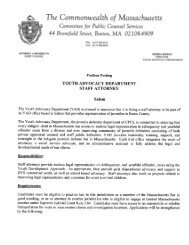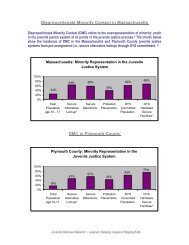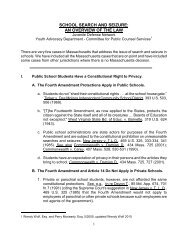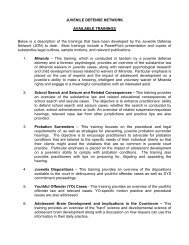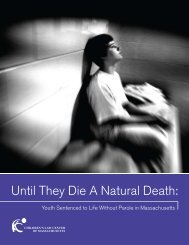States rethink 'adult time for adult crime' - the Youth Advocacy Division
States rethink 'adult time for adult crime' - the Youth Advocacy Division
States rethink 'adult time for adult crime' - the Youth Advocacy Division
Create successful ePaper yourself
Turn your PDF publications into a flip-book with our unique Google optimized e-Paper software.
"When you teach someone to swim, you don't just throw <strong>the</strong>m in <strong>the</strong> deep end and hope <strong>the</strong>y do<br />
great," said Abby Anderson, executive director of <strong>the</strong> Connecticut Juvenile Justice Alliance, <strong>the</strong><br />
nonprofit agency that spearheaded <strong>the</strong> campaign to change <strong>the</strong> law.<br />
When you teach someone to swim, you don't just throw <strong>the</strong>m in <strong>the</strong> deep end and hope <strong>the</strong>y do<br />
great.<br />
--Abby Anderson, executive director, Connecticut Juvenile Justice Alliance<br />
Originally, Connecticut child advocates pushed legislation that raised <strong>the</strong> age to 18, but budget<br />
cuts <strong>for</strong>ced <strong>the</strong> state to raise <strong>the</strong> age to 17.<br />
The policy shift in Connecticut, a state that once sent <strong>the</strong> highest number of juveniles to <strong>the</strong> <strong>adult</strong><br />
system, is catching on in o<strong>the</strong>r states. This month, Illinois stopped sending 17-year-olds who<br />
commit misdemeanors to <strong>the</strong> <strong>adult</strong> system. Instead, <strong>the</strong> offenders are sent to <strong>the</strong> juvenile system<br />
where drug treatment and counseling are often required.<br />
In North Carolina, ano<strong>the</strong>r state where <strong>the</strong> criminal justice system automatically views 16-yearolds<br />
as <strong>adult</strong>s, a bill was introduced last spring to raise <strong>the</strong> age a teen can be charged as an <strong>adult</strong><br />
to 18. That measure in <strong>the</strong> bill was rejected, but lawmakers established a task <strong>for</strong>ce to study <strong>the</strong><br />
proposal with a deadline of 2011.<br />
Meanwhile, lobbying ef<strong>for</strong>ts to raise <strong>the</strong> age continue in o<strong>the</strong>r states. In Georgia and Wisconsin,<br />
where a 17-year-old is considered an <strong>adult</strong>, lawmakers and juvenile advocates have been<br />
working toward change <strong>for</strong> <strong>the</strong> past year.<br />
A precise number of how many children are tried in <strong>adult</strong> court is difficult to ascertain because<br />
states keep records differently, but some experts estimate about a quarter of juveniles are<br />
prosecuted in <strong>the</strong> <strong>adult</strong> court system.<br />
On a single day in 2008, more than 7,700 children younger than 18 were held in <strong>adult</strong> local jails<br />
and 3,600 in <strong>adult</strong> state prisons, according to a 2009 University of Texas-Austin report.<br />
The juvenile system is based on a rehabilitative approach, compared to <strong>the</strong> punitive <strong>adult</strong> system,<br />
child advocates point out. They argue that <strong>the</strong> <strong>adult</strong> system teaches juveniles to become <strong>adult</strong><br />
criminals, which places <strong>the</strong> community at risk.<br />
While some states are questioning <strong>the</strong>ir juvenile sentencing policies, sentencing experts say<br />
raising <strong>the</strong> ages or eliminating mandatory sentences remains politically risky. Much of what<br />
states decide to do with <strong>the</strong>ir juvenile policies may depend upon Connecticut's outcome.<br />
Jeffrey Fagan, a Columbia University law professor who has studied juvenile crime, said he<br />
thinks re<strong>for</strong>m will come in stages, such as Illinois' new law, which addresses juveniles<br />
committing misdemeanors but not o<strong>the</strong>r crimes.<br />
The teenage brain is like a car with a good accelerator but a weak brake.<br />
--Professor Laurence Steinberg, Temple University




